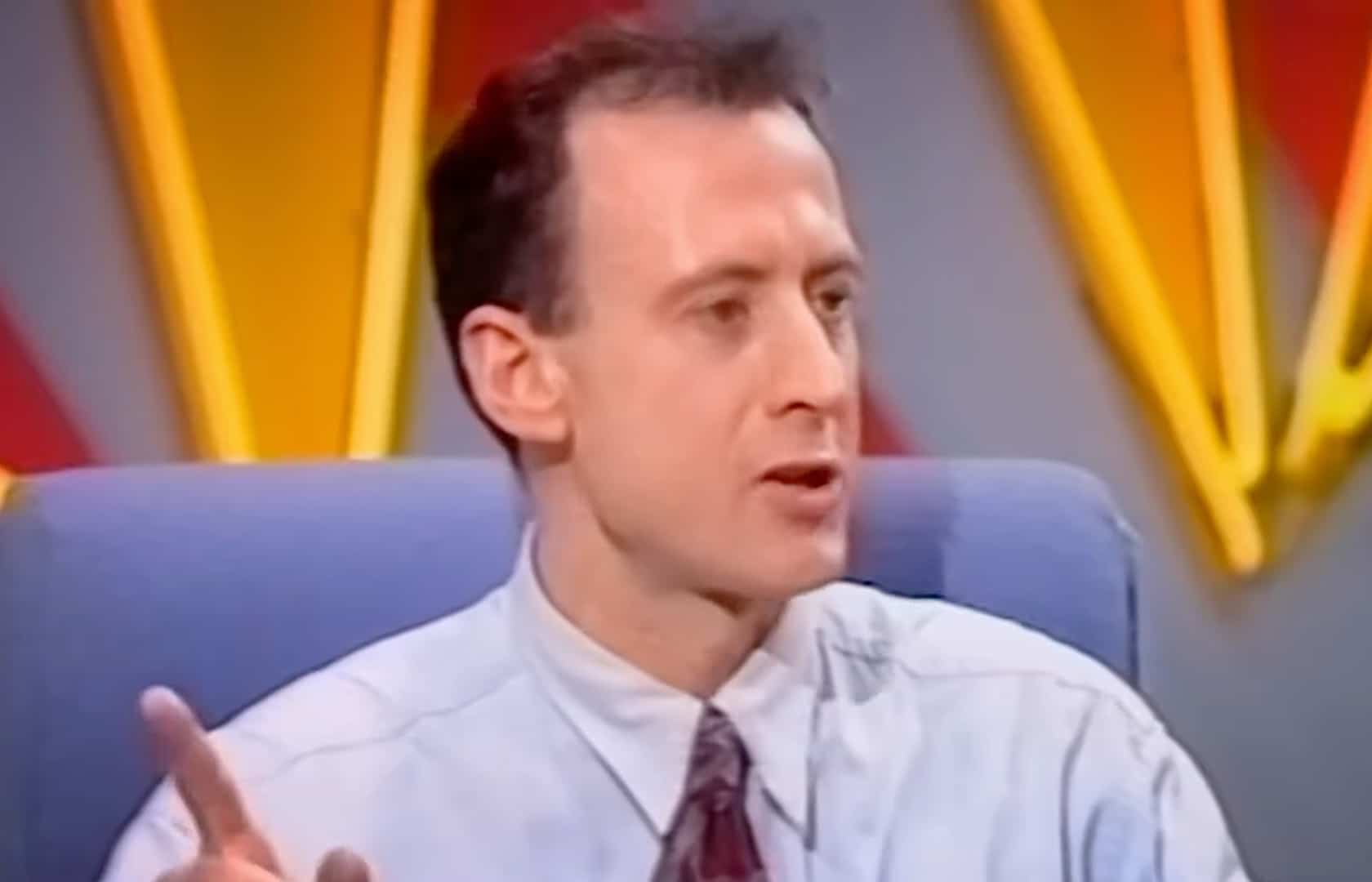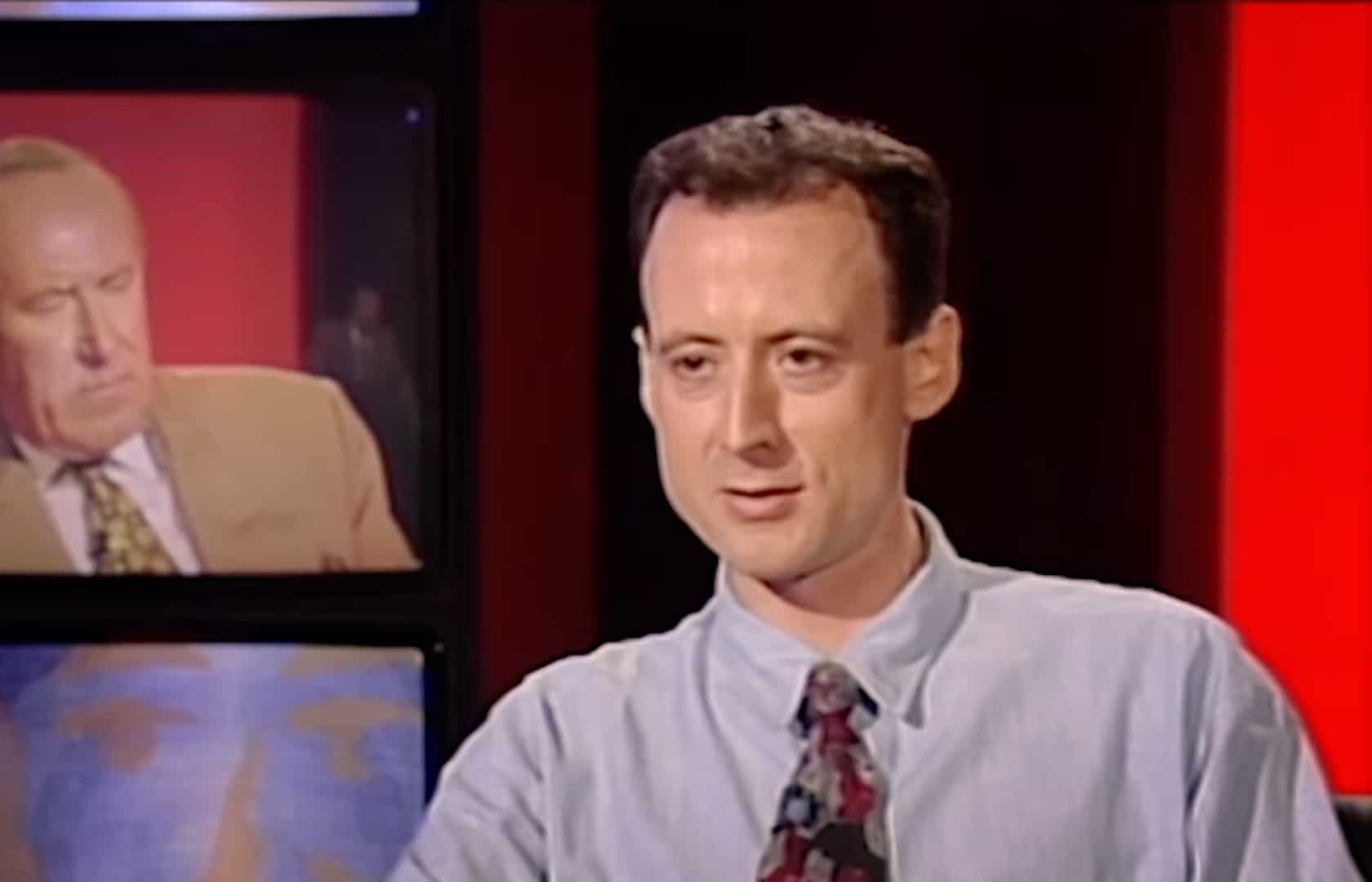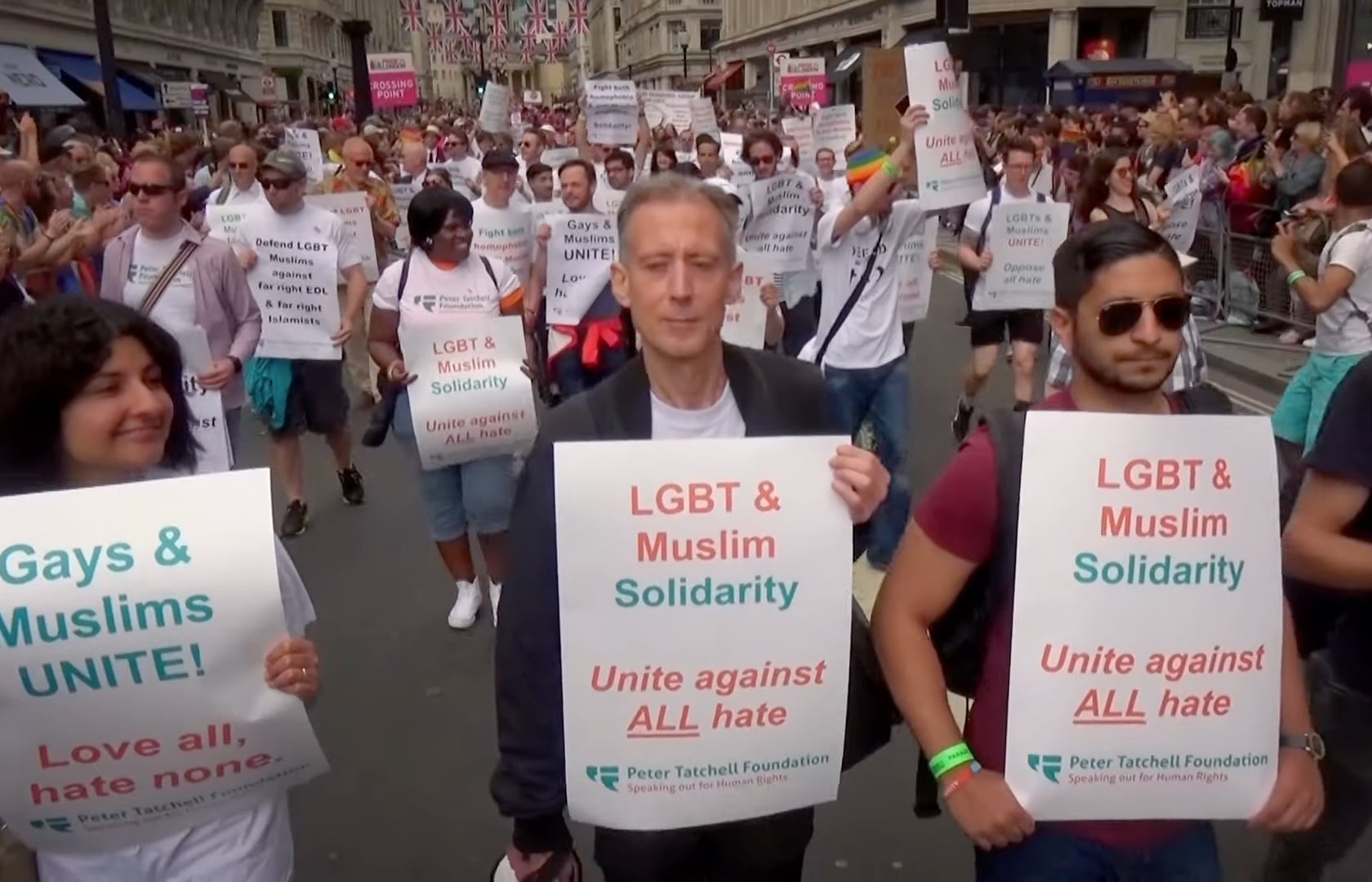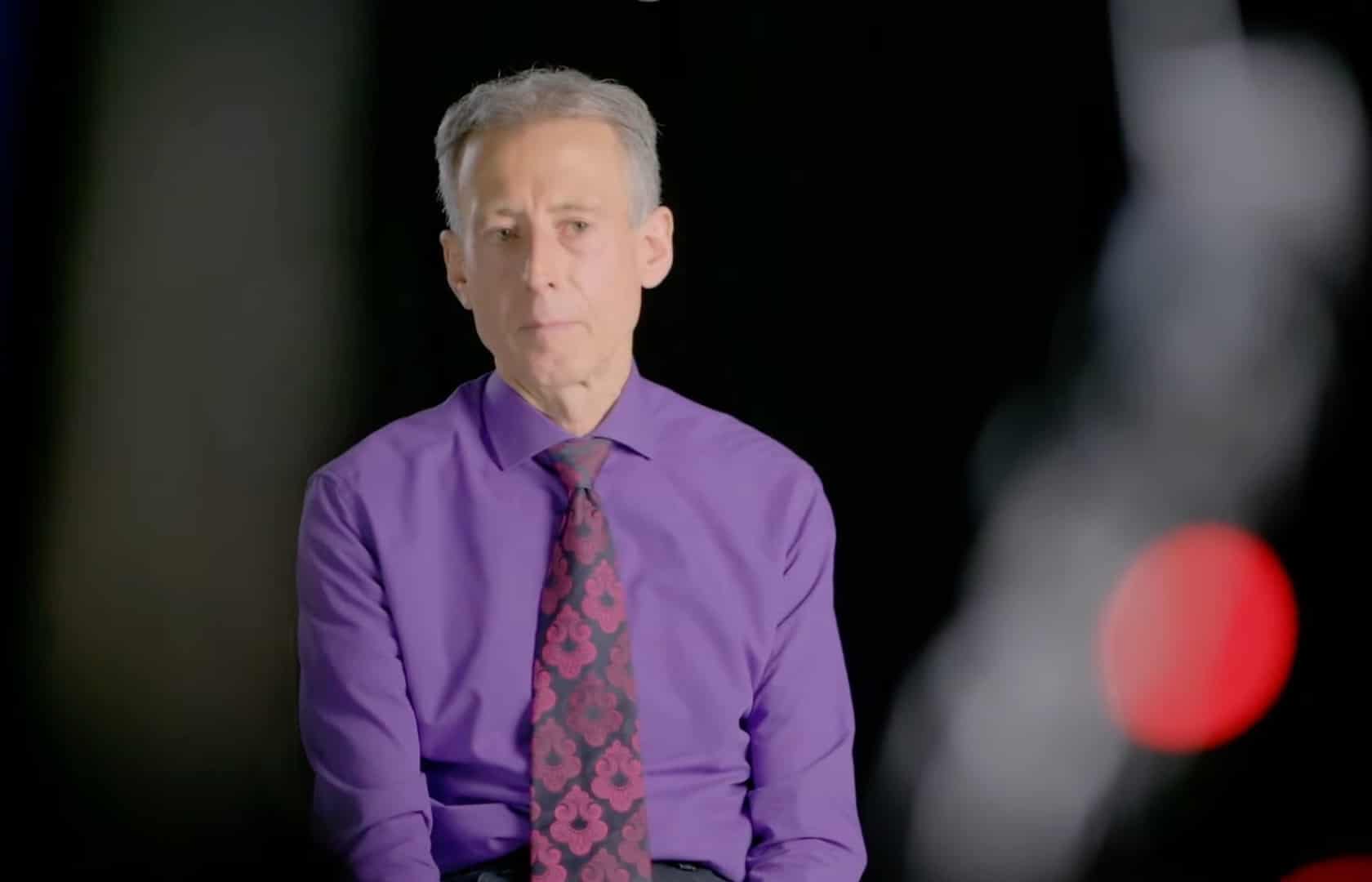Peter Tatchell in the documentary Hating Peter Tatchell. (Netflix)
When Peter Tatchell was a 17-year-old growing up in Australia, he started writing letters to the press arguing that homosexuality should be decriminalised.
It was by no means an easy fight for him to take on. Looking back, he admits that he was “terrified” that his efforts to secure rights and freedoms for LGBT+ people would get him into trouble with the law.
“I feared a policeman’s knock at the door,” he tells PinkNews. “I was always thinking, will the newspaper hand over my letter and address to the police and will me and my boyfriend get arrested? But I thought to myself, ‘No, we’ve got to fight for our rights.’”
In many ways, that story is reflective of Peter Tatchell’s overarching approach to human rights. Throughout his life, he has been horrified and repulsed by the indignities and abuses LGBT+ people have had to face. Many will relate to that feeling – but few actually do something about it.
The story of his extraordinary activism plays out in the Netflix documentary Hating Peter Tatchell, which sees the activist interviewed by his longtime friend Ian McKellen about the many battles he and other LGBT+ people have undertaken, painting a revealing picture of the man behind the activism.
Peter Tatchell knew from the get-go that being gay was ‘wonderful’
Peter Tatchell was born in Melbourne, Australia, to what he describes as an “extreme evangelical Christian” family. He did not have an easy childhood – he grew up in a time when homosexuality was seen as one of the worst possible sins, which meant coming out as gay was impossible for a great many people.
But that wasn’t the case for Tatchell. At the age of 17, he started working, which led to him meeting gay people his age for the first time. Shortly afterwards, he embarked on his first relationship.
“From the moment we first had sex, I knew immediately that I was gay and that it was wonderful,” Tatchell tells PinkNews. “At the time, in the late 1960s, male homosexuality was still totally illegal in the state of Victoria. You could be jailed for several years, and even, in some circumstances, forced to undergo compulsory psychiatric treatment. There were no LGBT+ organisations in Melbourne at all. So I was very lucky to quickly fall in love and have a great relationship.”
That experience, he says, led to him quickly coming to the realisation that the Christian tradition he had been brought up in was completely wrong when it came to homosexuality. “I never had a moment’s guilt or doubt. And within a few months, I was doing one-man campaigns for LGBT+ rights in Melbourne. I tried to set up an LGBT+ rights group with the few gay friends that I knew, but they were all too frightened. In fact, they told me: ‘Go away, you’ll get us all arrested,’ – in other words: ‘What do you know? You’re only 17 years old.’”

Still, Tatchell persevered, inspired by the Black civil rights movement in the US. “I was passionately in support of Dr Martin Luther King and the campaign of non-violent, civil disobedience that he and other African-Americans organised. Because there were no LGBT+ organisations in Melbourne, and I didn’t know anything about a gay movement anywhere else, I adapted their ideals, values and methods to the struggle for LGBT+ rights. It was my template then, and it’s still my template today.”
Shortly afterwards, Tatchell relocated to London – and he brought his tactics of non-violent civil disobedience with him. He started employing those tactics through his work with the Gay Liberation Front in the early 1970s and later with OutRage! in the 1990s. In the years that have elapsed since, he has taken part in more than 3,000 direct action protests. He has been arrested more than 100 times, and has been viciously assaulted countless times by homophobes and far-right extremists: “But I’m still here, and I’m still battling on,” Tatchell says.
Though there’s been plenty of change throughout Tatchell’s time in activism, not all of it has been for the better. Tatchell was one of the founders of the first ever Pride march in London: a politically charged affair that was designed to draw attention to the injustices faced by LGBT+ people. He is dismayed by the “corporate and commercialised” Pride marches that happen today.
“They are depoliticised and often barely mention LGBT+ human rights, and that is not what Pride is meant to be,” he says. “The original Pride was both a celebration and a protest. Today, it’s mostly just a big party with no protest – but there are still battles to fight, like securing a ban on conversion therapy and securing rights for trans people.”
I was physically assaulted over 150 times, which included two attempts to run me down in a van.
A decade after he was involved in setting up the first Pride march, Tatchell briefly tried to take his activism into the political arena when he ran as a Labour candidate in the Bermondsey by-election. That election is explored in-depth in Hating Peter Tatchell because of just how unnerving and degrading the entire experience was for Tatchell.
“For me, it was like living through a nightmare,” he reflects. “The tabloid press published false allegations to smear and discredit me. I had over 30 attacks on my flat, including bricks and bottles through the window, and two arson attempts. On top of that, I was physically assaulted over 150 times, which included two attempts to run me down in a van. It was a very frightening time. People who put up election posters supporting me got bricks through their windows. There’s never been a by-election like it since.”

The backlash was, of course, homophobic in nature, while the far-right also played a part. Needless to say, he lost.
“All the policies I stood for that were denounced as extremist at the time are now the mainstream. I argued for LGBT+ rights, for a national minimum wage, for a negotiated political settlement in the north of Ireland, and for a comprehensive equality law. Everybody, even the Tories, now support all that.”
The experience was hellish for Tatchell – but some good came out of it. There was “a wave of public and political revulsion” in the months afterwards about the way he had been treated.
“A lot of people felt very guilty that they either had been a part of it or hadn’t spoken out against it, so that meant that when Chris Smith came out [as the UK’s first openly gay MP]a year later, he didn’t face any of the backlash and demonisation that I went through,” he says. “People were so ashamed about what happened to me that they didn’t dare attack Chris Smith. So I’m really glad that my baptism of fire made it much easier for subsequent gay candidates to be out and get elected.”
Margaret Thatcher ‘has queer blood on her hands’
That’s not to say that homophobia was solved overnight. In fact, things were to get much worse in Britain before they would get better. Shortly after Tatchell was defeated in the Bermondsey by-election, the full effects of the AIDS epidemic started to hit Britain. As he had done with every LGBT+ crisis up until that point, Tatchell leapt into action.
“Outside of a war, young men do not die in the numbers that were slain by HIV and AIDS,” he says. “It was like being on a battlefield. I remember going to Heaven nightclub and suddenly people I’d known for years that would attend every week disappeared. They were in hospital or dead. It was an incredibly traumatic period made worse by the tabloid vilification of people with HIV and AIDS, and by conservative politicians who declared open season on our community.”
The epidemic culminated in Margaret Thatcher’s Section 28, which banned the “promotion” of homosexuality in schools and by local authorities. The result, Tatchell says, was that gay men were left without access to information about safer sex in the middle of a health crisis.
She let us die. She let hundreds of us die before she could be bothered to do anything.
“Indeed, many of those young men died as a result of sex education neglect as a result of Section 28,” he says. Needless to say, Tatchell does not have any kind words to say about Thatcher.
“There’s never been a prime minister before or since who did more harm to the LGBT+ community,” he says. “It wasn’t just that her government legislated Section 28, she also launched two consecutive campaigns for family values and a return to Victorian values, neither of which had any place for LGBT+ people. On top of that, for the first few years of the HIV/AIDS pandemic, when only gay and bisexual men were dying, her government did absolutely nothing. She let us die. She let hundreds of us die before she could be bothered to do anything. Margaret Thatcher has queer blood on her hands.”
No British broadcasters would fund a documentary about Peter Tatchell
All of these things and more are explored in Hating Peter Tatchell. The idea for the project first came about in 2015, when director Christopher Amos discovered that a documentary had never been made about Tatchell’s extraordinary life.
“He looked at all these TV shows and radio programmes I did in the 1980s and 1990s and couldn’t believe the vile hatred directed against me by homophobes and right-wing conservatives,” Tatchell says. “So that’s how the title Hating Peter Tatchell came about.”
Sadly – and perhaps tellingly – Amos couldn’t get anyone in Britain to fund the film, which led him to Australia, where Wild Bear Entertainment jumped at the chance. Netflix later agreed to carry the documentary after Elton John and David Furnish joined as executive producers.
Tatchell “had very little to do with the film”, but he was glad his now famous exchange with former boxer Mike Tyson made the cut. In 2004, Tatchell famously confronted Tyson about some of the anti-gay remarks he had made about other boxers.
“I thought he needed to be challenged, so I turned up outside his gym and as he went in I challenged him face to face,” Tatchell recalls. “At first I thought he was going to punch me and knock me to the ground, but then he saw the TV crews and the journalists and we began a dialogue. The great thing is that at the end, Mike Tyson publicly said he opposed discrimination against gay people and supported equality. At the time, he was the first major, macho sports star to back our call for equal rights. It was a great redemption story.”

Tatchell has had many victories in his fight for LGBT+ rights – but he knows the battle is far from over. Today, he is still incensed by the injustices facing the trans community – and he’s sick and tired of the government’s delaying tactics on conversion therapy. He is deeply concerned by the decision to hold a public consultation on the topic before legislation is brought forward – he thinks ministers are trying to “appease” religious organisations.
“It’s shocking that the government should yet again delay a ban on conversion therapy with the excuse of the need for further consultation. We’ve had consultations in the past, we don’t need anymore,” he says. “This is, I think, the government’s desperate attempt to generate enough responses from religious groups so that it can justify some exemptions for churches, mosques, synagogues, and temples.”
More broadly, Tatchell says the UK has been backsliding on LGBT+ rights since 2013, when same-sex marriage was legalised in England and Wales. He draws attention to the rise in hate crime and the government’s refusal to reform the Gender Recognition Act (GRA) as evidence that things are getting worse for LGBT+ people.
We are all, to varying degrees, gender non-conformists.
“It’s shocking to think that our government is so reluctant to adequately protect existing rights, but it’s also failing to remedy the remaining reforms that need to be enacted,” he says. “Trans people are on the frontline of the battle for LGBT+ rights. They are the ones on the receiving end of the most toxic campaign we have witnessed since the 1980s and the hysteria over HIV and AIDS. It’s really important that we stand with our trans siblings.
“Trans rights and LGB rights are part of the same human rights continuum. We are all, to varying degrees, gender non-conformists. We don’t follow society’s traditional expectations concerning gender identity and sexual orientation – that gives us a common interest in working together.”
He is also at pains to dispel the myth pushed by some “gender critical” feminists that being trans is a “fad” that has only cropped up in the last few years. “Trans people were involved in the Gay Liberation Front way back in the early 1970s,” he says. “The Gay Liberation Front protested in support of trans people who were refused service in some cafés and restaurants. So trans has always been very much a part of our movement. It’s not something new. What is new is the way in which some LGB people have turned against our trans siblings. And that is profoundly shocking and against the ideals on which our movement was founded.”
He continues: “My message to trans people is: take the lessons from history. You have a just cause, and like all just causes, you will triumph in the end. Nothing can hold back the just struggle of trans people for dignity, respect and human rights.”
Tatchell has been fighting for LGBT+ rights for five decades, but one thing is clear – the fight is far from over. And as long as change is possible, he will be at the forefront of the UK’s fight for equality and respect for the UK’s increasingly embattled LGBT+ community.
Hating Peter Tatchell is streaming on Netflix.
